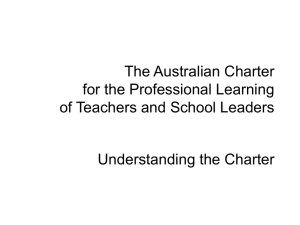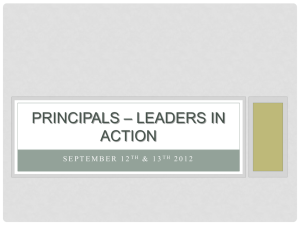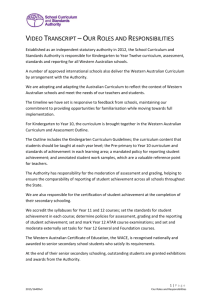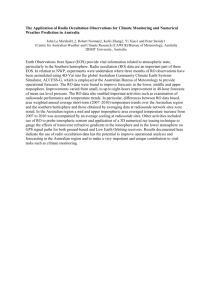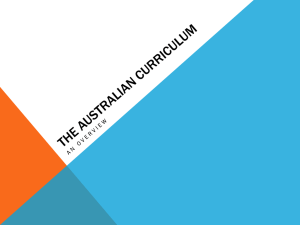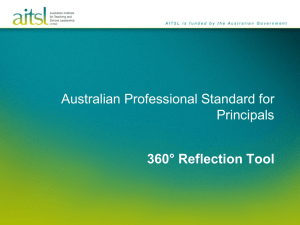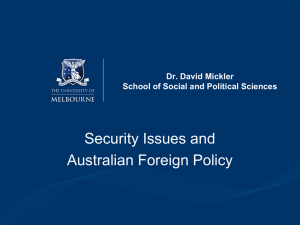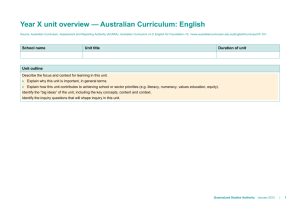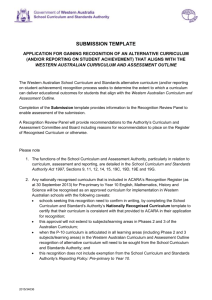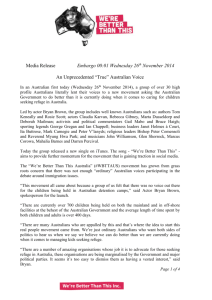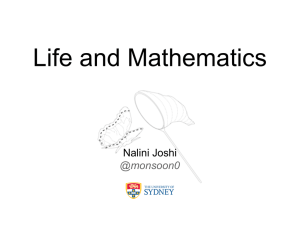Australian Teacher Performance and Development Framework
advertisement
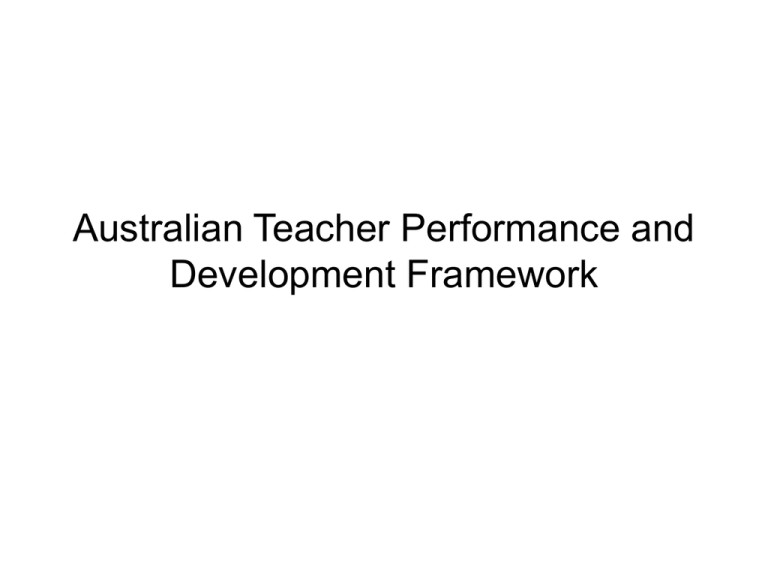
Australian Teacher Performance and Development Framework The Melbourne Declaration on Educational Goals for Young Australians makes clear that Australia aspires not to be among the best in the world, but to be the best. It acknowledges the challenges and opportunities of the 21st century and provides two simple, but powerful, goals to guide Australian education: > Goal 1: Australian schooling promotes equity and excellence > Goal 2: All young Australians become: – successful learners – confident and creative individuals – active and informed citizens Melbourne Declaration on Education Goals for Young Australians, 2008 In today’s global economy, countries need high-quality education systems that will teach their citizens the skills necessary to meet the challenges of tomorrow Strong Performers and Successful Reformers in Education, © OECD, 2011 http://www.oecd.org/document/7/0,3746,en_2649_35845621_49428807_1_1_1_1,00.html What should we be trying to achieve in our school? > Internationally, there is unequivocal evidence that the quality of teaching is the most significant in-school factor affecting student outcomes > There is also strong evidence that better appraisal and feedback leading to targeted development can improve teacher performance Studies show that more effective teachers are the key to producing higher performing students. Conservative estimates suggest that students with a highly effective teacher learn twice as much as students with a less effective teacher. B Jensen, Better teacher appraisal and feedback, Grattan Institute, 2011 Australian teachers report that they do not always get the feedback they need to improve Teacher performance has been shown to improve when the following conditions are present: > Opportunities for teacher self-reflection and objective setting > Regular classroom observation and provision of constructive feedback from their school leader, as well as their peers > Frequent feedback on classroom performance as an ongoing dialogue, not a once a year discussion > Shadowing, coaching and mentoring from peers and leaders > Opportunities to contribute to and engage in teamwork, collaboration and action learning with other teachers to obtain the best possible outcomes for students Growing our potential, Hay Group, 2012 > The Australian Charter for the Professional Learning of Teachers and School Leaders > A resource for planning, design and evaluation > Companion document to the Australian Teacher Performance and Development Framework, National Professional Standards for Teachers, and the National Professional Standard for Principals > The Framework and the Charter work together > They articulate what teachers require for professional growth and development > Assessment, appraisal, feedback and access to high quality learning opportunities are required for professional growth to occur > The Charter advises on how professional learning can be most effective > Affirms the central importance of professional learning to teacher quality and student learning > Recognises the importance of culture and context > Articulates the expectation that professionals actively engage in professional learning throughout their careers > Describes three key characteristics of professional learning: - relevant - collaborative - future focused > Calls on teachers, school leaders and system leaders to take action > Don’t fix what isn’t broken > Stop doing what doesn’t work, and do something else > Positive change is happening all the time: our challenge is to identify and amplify useful change Dandenong North Primary School, Victoria Think, Group, Share What strategies are contributing to Dandenong North Primary School’s attempts to build a comprehensive approach to teacher performance and development? > Record your responses on the worksheet > Each group to present their responses > Consolidate the responses > Identify those that might be relevant to your school, and what would need to change > The Australian Institute for Teaching and School Leadership (AITSL) is working with stakeholders on national consultation on the implementation Australian Teacher Performance and Development Framework > The Framework will strengthen a performance and development culture in our schools that focuses on improving teaching and, through this, improving student learning The Framework seeks to: create a culture of improvement, feedback and growth for all teachers within all schools everyday > A new resource for Australia’s teachers > Supports teachers to receive effective performance and development opportunities > Ensures that every teacher, in every school receives regular, appropriate and constructive feedback on their performance > Provides opportunities to identify areas for development > Provides effective and ongoing support to further improve practice > We will have a national commitment to a clear, shared and sustained focus on student learning, and on quality teaching as the means to achieve this > Through development and implementation of a national framework Australian education systems should be well placed to be among the best in the world Components of the Framework: > A culture of performance and development > Performance and development cycle > Essential elements > Importance of implementation > Focus on student outcomes > Clear understanding of effective teaching > Leadership > Flexibility > Coherence What would your allocated theme look like in practice? > School leadership is essential to creating a culture of professional improvement, feedback and growth within a school > Leadership must come from all levels within a school > Within the Framework opportunities for shared leadership exist through the roles of delegate and mentor/coach > Principals and other school leaders are entitled to support to implement performance and development in their schools The Standard for Principals takes into account the crucial contribution made by principals The Standards provide a common language for coming to a shared understanding of what effective teaching looks like in the context of a particular school > Dual purpose: - improvement - accountability > Map progression across career stages: - Graduate - Proficient - Highly Accomplished - Lead > The challenge is to create a school culture that focuses on improvement in teaching and learning, in a climate of trust, collaboration and ongoing feedback > These improvement activities need to align with the school’s plans > It is only within this performance and development culture that a focus on teacher performance and development can deliver its full benefits What conditions make the development of a school culture that focuses on an improvement in teaching and learning possible? > Performance and development occurs in a cycle which provides a focus for appraising, developing and refining teaching and recognising the entitlements of teachers to receive feedback and support > Elements of the cycle are interwoven, will not necessarily occur in order and may take more or less time depending on circumstances > However, the cycle provides a useful way of thinking about the process, and assists in identifying its important elements The cycle provides a useful way of thinking about the process of performance and development and assists in identifying its important elements The essential elements are derived from research and existing effective practice: > Objectives > Action & development > Evidence > Feedback, including formal review Research evidence clearly indicates that an effective and achievable performance and development cycle has many elements. High 2 1 3 4 Impact Low Low Achievability High > Matrix base quadrant boards > 10 cards identifying effective performance and development practices > 6 spare blank cards Task: > Work in groups of 4 > Each person in turn is to place the ten cards in their chosen square for their school at this time. Take time to explain the reason/s for your choice > Together reflect on what you have learnt about your school’s/organisation’s current structures recording any insights > Effective, ongoing and constructive feedback on performance > Access to support and development opportunities > Increased professional growth through mentoring and coaching > Enhanced professional satisfaction > Formal recognition of professional achievements > Access to networks through school and system wide collaboration Links to other processes > Resources, tools and templates > Stimulus materials > Examples of effective practice > Professional learning modules > Online communities of practice > Research > Form groups of 4 > First brainstorm the challenges > Now identify any mitigation strategies that your group can think of > Finally outline the priorities for support required to enable effective implementation > Share with all participants Ringwood Secondary College, Victoria > What existing strategies are contributing to your school’s attempts to build a comprehensive approach to teacher performance and development? > What would you like to see in a future video highlighting your school’s performance and development practices? Table discussion… > Look through your card pack which offers a series of hot topics > Select a hot topic for discussion at your table > Share your thinking with us > Share your own hot topics with the Australian educational community Contact us: www.aitsl.edu.au Who dares to teach must never cease to learn John Cotton Dana




